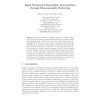Free Online Productivity Tools
i2Speak
i2Symbol
i2OCR
iTex2Img
iWeb2Print
iWeb2Shot
i2Type
iPdf2Split
iPdf2Merge
i2Bopomofo
i2Arabic
i2Style
i2Image
i2PDF
iLatex2Rtf
Sci2ools
104
click to vote
MCS
2001
Springer
2001
Springer
Input Decimation Ensembles: Decorrelation through Dimensionality Reduction
Using an ensemble of classifiers instead of a single classifier has been shown to improve generalization performance in many machine learning problems [4, 16]. However, the extent of such improvement depends greatly on the amount of correlation among the errors of the base classifiers [1, 14]. As such, reducing those correlations while keeping the base classifiers’ performance levels high is a promising research topic. In this paper, we describe input decimation, a method that decouples the base classifiers by training them with different subsets of the input features. In past work [15], we showed the theoretical benefits of input decimation and presented its application to a handful of real data sets. In this paper, we provide a systematic study of input decimation on synthetic data sets and analyze how the interaction between correlation and performance in base classifiers affects ensemble performance.
| Added | 30 Jul 2010 |
| Updated | 30 Jul 2010 |
| Type | Conference |
| Year | 2001 |
| Where | MCS |
| Authors | Nikunj C. Oza, Kagan Tumer |
Comments (0)

